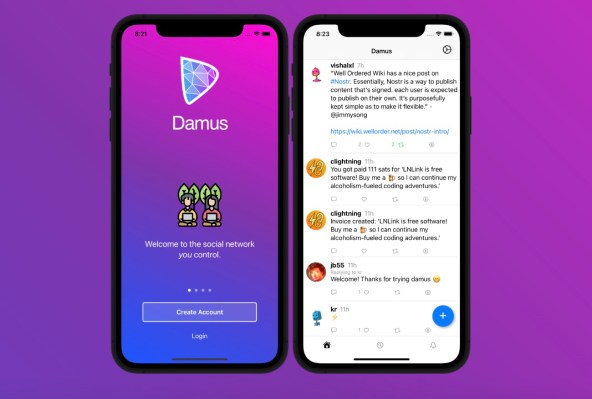Damus, one of the fastest-growing Twitter alternatives, has been pulled from China’s App Store just two days after the app was approved by Apple.
The app, which runs atop the Jack Dorsey-backed decentralized social networking protocol Nostr, was removed from the China App Store per request by the country’s top internet watchdog because it “includes content that is illegal in China,” according to an app review notice Damus received and shared on Twitter.
Being decentralized means there is no central authority that decides who can participate or say what on the platform. That made Damus’ approval process difficult at first, as Apple requires services to have a mechanism for flagging objectional content, but Damus eventually worked out a way to get listed in Apple’s App Store on February 1.
The decentralized nature of the app no doubt led to its short-lived debut in China, where information is under tight control by the government. Social networks legally operating in China all have censorship tools baked in to eliminate illegal content or information banned by the authority. Anonymity is non-existent as user signups are linked to people’s real identities.
The authority has cut off Damus’ distribution in the country through App Store. But it looks like access is so far intact. Those already with Damus on their phones can still view and comment on posts without having to circumvent the Great Firewall, the country’s censorship system that blocks or slows down certain foreign websites, as of February 3.
Nostr is built to be censorship-resistant through “relays,” a type of network responsible for receiving posts and distributing them to network participants. Users can publish their posts to multiple relays, and they only see content in the relays they connect to. So if one relay is censored, they can post their content through another. But having competing networks also undermines the platform’s network effects, meaning Damus isn’t really an ideal Twitter replacement.
“It’s more like a news group, interest group or fans club kind of thing,” says Frank Hu, COO at ByteTrade Lab, a web3 infrastructure startup backed by SIG Asia Venture Capital Fund.
“Users can choose relays and need to obey the codes there. Relays compete and relay owners also compete. Based on this competition, builders can build different communities — paid or free, censored or censorship-free, targeting fans of influencers or pornstars. It’s a relay-based free market.”
Is there a way to block every single relay? Hu reckons that censoring Damus, which is run on “multiple centralized servers” rather than a “fully decentralized” infrastructure, will be challenging. “It now has about 300 relays and people can make self-hosted relays, so it’s quite difficult to shut it down.”
It will be interesting to see how the app’s usage evolves in China over the next few weeks.
